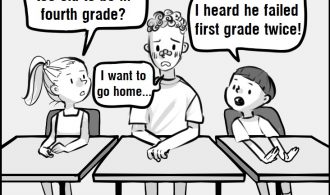Repetition of School Year: Not Crucial, Not Beneficial
LISA PHUNG
VICKY LAM
Staff Writers
Most schools within the United States mandate that underperforming students must repeat a school year. The most common cause of this policy is that struggling students are unable to pass certain comprehension tests, grasp basic concepts and excel with personal social skills. As a result, schools feel the need to hold students back for a year and make them repeat their lessons, which may actually be more detrimental than beneficial. Many negative results can be produced from grade retention such as the loss of motivation and stagnant improvement.
The leaders in childrens’ lives, such as parents, teachers and counselors, are the deciding factor on whether or not retention should be granted to a student. The common belief is that grade retention is valuable to the student and may even enhance their learning. A Florida test-based promotion policy mandated by the Florida legislature found that retention among students earned reading achievements as large as 0.4 standard deviations, a number that means positive growth across scores. However, these scores become insignificant as soon as retained students reach higher grade levels. Academic difficulty is much higher in the later years of education compared to elementary and middle school. The students who were retained continued to struggle, barely improving or even earning the same results. Holding students back will not benefit them more than allowing students to move on to the next grade level.
Furthermore, grade retention is one of the leading factors for high school dropouts. According to the National Association of School Psychologists, it is probable that more retained students will drop out of school. Students will remove themselves from the educational equation and lead a completely different life that may be contradictory to what is socially ideal. Because students are retained, they eventually lose motivation to catch up and might even give up all together.
Having students repeat a grade also creates behavioral problems and promotes poor achievement and social skills. A longitudinal study of grade retention researched within the book School Psychology Quarterly, discovered that students who repeated a school year showed inadequate social adjustment, more negative attitudes toward school, lower achievements and less frequent attendance. Therefore, this leads to negative impact on them which will be much more of a problem than ever.
Schools may practice several different methods rather than resorting to grade retention. Summer school, after school tutoring and even weekend classes are all viable alternatives to prevent students from being withheld. These other options not only assist students to correct their mistakes, but also allow students to avoid the negative consequences that retention possesses.
Holding students back is not helpful for students. Rather than giving students the extra help they need, schools are giving students a troublesome burden to carry around instead. Grade retention will impact students negatively, and it will ultimately hurt their academic potential rather than leading to academic success.
